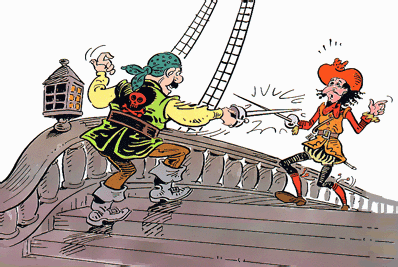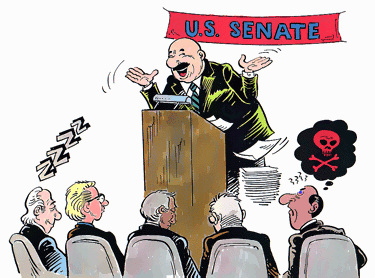Filibuster
(from pirates to American politics)
Filibuster, Pirates in the U.S. Congress
At first, "filibuster" referred to a "free booter" or "pirate", who engaged in illegal activities for self gain; then it became "an endless discourse to impede the passage of an 'unwanted' congressional bill".

Originally our current spelling of filibuster came to us from Dutch, vrijbuiter, a free booter (a "pirate" or "plunderer" a derivative of buit, "loot", to which English booty is related).
According to The Oxford English Dictionary, in the 16th century, it was flibutor in English; then in the late 18th century, the French form, flibustier, was adopted into English. This form was used until after the middle of the 19th century.
About 1850-54, English adopted the form filibuster, from Spanish filibustero and it was applied to certain adventurers who committed unsanctioned activities in the West Indies and Central America.
"Filibuster" superseded the earlier flibustier even with reference to the history of the 17th century. The term was used to refer to 19th-century groups which were organized from the United States to illegally invade and revolutionize certain Spanish-American territories. The best known of these filibusterers were those led by Narcisco Lopez against Cuba (1850-1851) and William Walker against Sonora (1853-1854).

Today "to filibuster" refers to members of a legislative group, especially of the U.S. Senate, who obstruct (or block) the passage, or vote, of a bill by making long speeches, introducing irrelevant issues, or introducing technicalities, etc.
Filibustering techniques are done because those who participate in such actions don't have enough votes to defeat an unwanted bill.
The earliest quotation about "filibuster" which was used in The Oxford English Dictionary, appeared in 1853 and the term is now chiefly used in the United States; but its use is not exclusive to American legislatures. Under Parnell, Irish Nationalists tied up the House of Commons for 26 hours in July, 1877.
In the January 4, 1853, issue of the Congressional Globe, there is the statement, "I saw my friend . . . filibustering, as I thought, against the United States." The Congressional Record of February 11 states that, "A filibuster was indulged in which lasted . . . for nine continuous calendar days."
In 1872, "Vice President Schuyler Colfax ruled that 'under the practice of the Senate the presiding office could not restrain a Senator in remarks which the Senator considers pertinent to the pending issue.'" Any congressman who boasts of his filibustering skills should be aware that he is just like a pirate, etymologically, using verbal tactics to steal the voting rights of his fellow congressional associates.
Finally, in 1975, Senators changed the filibuster requirement to stop such a paralysis of the Senate from 67 votes to 60, after concluding that it only takes a simple majority of Senators to change the rules governing their proceedings.
As Senate Majority Leader, Mike Mansfield (D-Montana) said at the time: "We cannot allow a minority of the senators to grab the Senate by the throat and hold it there."
Over a decade ago, Lloyd Cutler, the former White House Counsel to Presidents Carter and Clinton, concluded that the Senate Rule requiring a super-majority vote to change the rule is "plainly unconstitutional".
